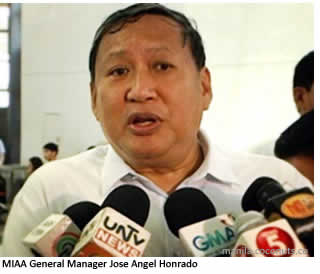|

 verseas Filipino Workers
(OFWs) are up in arms with regards to all these bullets showing up on
airport x-ray machines inside luggage and bags of unsuspecting
passengers. Philippine laws make it a serious offence to bring even a
single bullet on an airplane—a situation that scam artists in an around
Philippine airport terminals have quickly exploited to the hilt. verseas Filipino Workers
(OFWs) are up in arms with regards to all these bullets showing up on
airport x-ray machines inside luggage and bags of unsuspecting
passengers. Philippine laws make it a serious offence to bring even a
single bullet on an airplane—a situation that scam artists in an around
Philippine airport terminals have quickly exploited to the hilt.
The scam is called "tanim
bala" (planted bullet) or "laglag bala" (dropped bullet) and occurs this
way: a single bullet is slipped into a passenger's luggage or bag
sometime before it goes through an airport's x-ray machine. The bullet
is then detected by the x-ray device and the owner is detained for
questioning. At some point money can be offered in exchange for charges
being dropped.
Recently, departing or
arriving passengers from a young American missionary, to a 65-year-old
Filipina grandmother have been found with bullets hidden in their bags.
So far this year there have been a total of 84 incidents of ammunition
found in luggage and bags of airline travelers; up from just 12
incidents for the same period in 2014.
Obviously, some wily
Filipinos have figured out how to make already harried travelers part
with some or all of the money they have on them. Aside from all the
stress normally involved with travel, people flying to, or from, the
Philippines must now also guard against bullets being planted inside
their bags.
This is first and
foremost a major national embarrassment. The Philippines spends billions
of pesos promoting the country, but that money might just as well have
been flushed down the toilet because scams like this will surely scare
tourists away. Even overseas Filipinos will think twice about flying
home for a visit.
There have been calls
for Manila International Airport Authority General Manager Jose Angel
Honrado to step down, but as of this writing he has refused and instead
points to the Department of Transportation and Communications’ Office of
Transport Security (DOTC-OTS) as the agency that should be handling this
matter. Never mind that one of his duties as airport general manager is
to: "Monitor all activities at the Authority's terminal and to initiate
preemptive action to keep these from escalating into crisis situations." the Department of Transportation and Communications’ Office of
Transport Security (DOTC-OTS) as the agency that should be handling this
matter. Never mind that one of his duties as airport general manager is
to: "Monitor all activities at the Authority's terminal and to initiate
preemptive action to keep these from escalating into crisis situations."
Honrado appears to be
the typical Filipino political appointee who refuses to accept blame and
will refuse to step down despite widespread clamor for his removal from
office. There is however, no denying the fact that as airport chief, he
is ultimately responsible for setting the tone and creating the
atmosphere where such shady schemes like "tanim bala' or "laglag bala"
are allowed to spread and even thrive.
President Benigno
Aquino III has so far refused to fire Honrado, or even acknowledge the
grave repercussions the scam will have on the economy and on the
perception foreigners have of the country. Many Aquino critics have
begun questioning the sincerity of his commitment to the "tuwid na daan"
(straight path) campaign now that just a few months are left in his
presidency.
OFWs who for decades
felt left-out and disenfranchised, have of late found their power and
their ability to influence events in the Philippines. they are
threatening to stop sending their monetary remittances unless this issue
is solved to their liking. And with the billions of dollars sent home to
the Philippines by these overseas workers each year, local leaders
cannot afford to turn a deaf ear to their complaints.
Published 11/03/2015 |